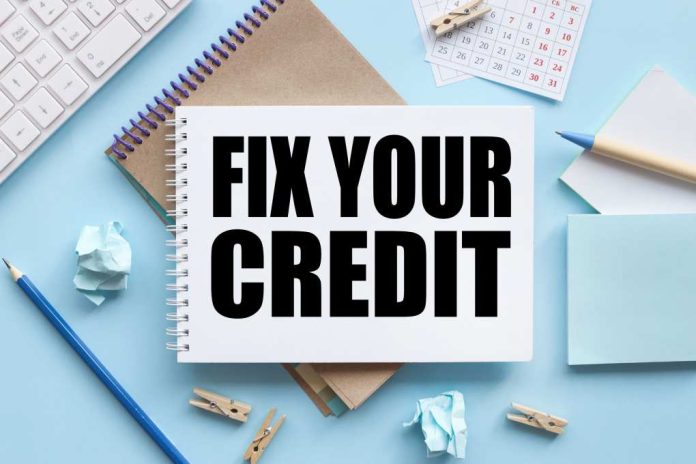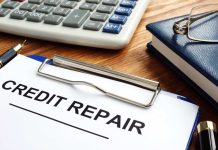
Managing credit can be hard to deal with for many Americans. If you find yourself in the same situation, you’re not alone. Your credit score may not be where it needs to be. If that’s the case, you might not be out of luck just yet! There are plenty of ways that people can work on fixing their credit. In fact, you could even begin the process of fixing your credit sooner than you realize.
Understanding Your Credit Score
In order to learn how to fix your credit, you must have a better understanding of your credit score. Your credit score is a number that ranges from as low as 300 to as high as 850. This score determines the creditworthiness of a consumer. Creditworthiness just refers to how reliable a consumer is when it comes to handling their credit. If you have a good score then lenders will view you as a good borrower.
Your credit score is calculated using the information found on your credit report. Your report holds a history of your credit account information like your number of active credit accounts, amount of debt, history of payments, and more. Credit bureaus are the ones that actually calculate your score. There are two main scoring models that they use which are the FICO credit model and VantageScore credit model. However, most of the time you will see the FICO score be used.
What Factors Impact Your Credit Score?
The information on your credit report will impact your credit score. However, this information can fall under five general categories. These categories each have their own impact on your report in their own way. Factors that impact your credit score include:
- Payment History (35%)
- Credit Utilization Ratio (30%)
- Credit History (15%)
- Hard Inquiries (10%)
- Variety of Credit (10%)
Payment History
This is the most important factor when it comes to your credit score and it accounts for 35% of it! This factor includes late payments, how late the payments were, on-time payments, accounts that went to collections, bankruptcies, foreclosures, and more. If lenders are trying to understand how you are as a borrower, this can help show a clear picture!
Credit Utilization Ratio
The amount that you owe compared to your total amount of available credit is referred to as your credit utilization ratio. This is the second most impactful factor on your credit score at 30%. Your credit utilization ratio looks at the amount of credit you’re using compared to your credit limit.
To better understand what your credit utilization ratio is, let’s look at an example. If you have 4 different credit cards and can use a total of $2,200 then that is your credit limit. This is the most amount of credit that you are able to use. This limit will be compared to how much credit you are using. If your credit card balances on these 4 credit cards total of $1,000 then that is how much credit you are currently using. The ratio would compare your usage of $1,000 compared to your limit of $2,200. A good rule of thumb is to keep your credit utilization rate below 30%! This means if your limit was $2,200 then you would want to spend no more than $660.
Credit History
Your credit history is also referred to as the age of your credit. The age of your credit includes factors like how long you have had credit, your oldest account, your newest account, the average age of your credit, etc. This isn’t the most important factor of your credit score since it only accounts for 15%. However, it is still important to be aware of! You should keep this in mind when considering closing down credit accounts. If you close a credit card account down (even if you don’t use it) then you may see your score decrease.
Hard Inquiries
Hard inquiries impact 10% of your credit score which isn’t much but it is still something. There are two kinds of inquiries. There are soft inquiries which do not impact your credit, and there are hard inquiries. Hard inquiries are a different story because they do impact your credit and unlike soft inquiries, require written authorization from the consumer. When lenders want to understand the risk involved with you as a borrower they will request to hard pull your credit which checks your credit information. This is typically done during the underwriting process! Luckily, hard inquiries shouldn’t be something you worry about too much and fall off after about 2 years.
Variety of Credit
Tied for last place in factors that impact your credit score is your variety of credit at 10%. Just like hard inquiries, this may not be the most important factor but it is something to keep in mind. Different forms of credit include credit cards, store accounts, installment loans, etc. Even if you only have one type of credit, you shouldn’t worry too much. Having a variety can just mean better credit health, but you don’t have to go out of your way to get a variety of accounts!
What is Considered a Bad Credit Score?
Having a bad credit score can make it hard to handle things like purchasing a home, buying a car, getting a loan, etc. If you have a bad credit score, lenders will look at you as a subprime borrower. If they feel you are a subprime borrower that means they take on a lot of risk when they lend to you. Even if you are approved, you can face higher interest rates which can cost you more money overall.
If you are using the FICO scoring model then there are different categories of a credit score. In general, anything below 669 is considered not a good credit score. Scores ranging from 580 to 669 are considered fair. Even though they aren’t categorized as good, they are still better than bad. However, credit scores that are less than 580 are considered bad.
How to Fix Your Credit
The best way to begin understanding your credit situation is by checking your credit report and your credit score. If you want to check your credit score quickly then you can usually do so through your credit accounts. Generally, credit card issuers provide their users who have credit accounts the ability to check their score any time for free. Popular credit card companies that do this include Discover, Capital One, etc.
Consumers are able to get a free credit report once every 12 months. You can access your free report by visiting the Annual Credit Report website. There are ways that you can improve your credit score if you find that it could be better. Even though it can feel overwhelming, there are more options than you may realize! Popular ways that people work on their credit include:
- Improving Their Personal Credit Management
- Hiring a Credit Repair Company
Improving Their Personal Credit Management
Life is crazy. You typically don’t have control over anything other than yourself. That is why taking your credit repair into your own hands can not only show improvement on your credit score but can make you get into better habits. Improving your personal credit management can mean:
- Disputing Any Inaccurate Information
- Paying Your Bills on Time
- Keeping Your Credit Utilization Rate Below 30%
- Paying Off Debt
- Reporting Additional Accounts
- Getting Help from a Credit Counseling Organization
Disputing Any Inaccurate Information
Once you get your credit report you will want to look for any errors that may be impacting your credit. Common errors include identity errors, inaccurate account status information, data management issues, and more. You can then dispute these errors with the credit bureaus. The dispute process may seem challenging but it doesn’t have to be! Credit bureaus are required to report accurate information on your credit report so pointing out errors and how they are invalid can get them removed from your report. Once removed from your report, their negative impact will fall off and you may see an improvement on your credit score.
Paying Bills on Time
Since payment history is such an important factor when it comes to your credit score, you will want to make sure you handle it properly. Making sure you pay your bills on-time when they are due is key to improving the health of your credit. If you are forgetful, then you may benefit from setting up automatic payments. When you do this, the payments that are due are automatically taken out of your bank account. This removes the stress of having to remember to pay. You will want to make sure you know what day the payment gets taken out so that you can check your bank account to make sure the funds are gone. Forgetting to make the payment may not be an issue you have. If you don’t have enough money to handle your bills then you will want to talk to your lender. Your lender may be more forgiving and flexible than you realize.
Keeping Your Credit Utilization Rate Below 30%
Like we said earlier, a good rule of thumb is to keep your credit utilization rate below 30%. However, if you want to see some real improvements, then paying off your card every month can mean some real boosts! Your credit utilization rate is the second most important factor when it comes to your credit so make sure you are aware of your credit limit and your current credit usage.
Paying Off Debt
Plenty of Americans deal with debt. In fact, the average American debt is $58,604 and 77% of households in the U.S. have at least some kind of debt. Common forms of debt include credit card debt, student loans, mortgage debt, etc. These debts can add up. There are different ways that you can tackle debt. You just need to find a way that works for your finances, lifestyle, and personality. Some people like starting with their credit card balances, while others like handling bigger debts first like a mortgage. When repaying debt make sure to check if there are any prepayment penalties. Some lenders will charge a fee if the consumer repays their debt too soon!
Reporting Additional Accounts
Experian Boost is a service offered by Experian (one of the main credit bureaus) that can help consumers improve their credit score. This service will report on-time payments for utility payments, phone payments, some streaming services, and more. When these scores get reported to the credit bureaus, they may be able to strengthen or even improve your score since it counts as a part of your payment history!
Getting Help From a Credit Counseling Organization
Improving your credit yourself means getting the right tools to help you along the way. That’s why you may benefit from getting in touch with a credit counseling organization. These organizations can educate you on a variety of financials like your money, debt, budget, credit score, and more. Generally, credit counseling organizations are nonprofit and their counselors are certified! You can go over your current financial situation and goals and they can give advice and education to help you.
Hiring a Credit Repair Company
Another option that consumers can turn to are credit repair companies. Credit repair companies offer repair services for a fee. However, the services that they provide are not special and consumers can do them on their own! However, they advertise that their knowledge and experience can help people save time and effort when dealing with disputes.
Even though credit repair companies may be able to help, they may not be the best option to consider. Instead of spending money on credit repair, you can do everything that they would do for free and put that money that you would’ve spent towards your savings or existing debts. If you are interested in getting a credit repair company you want to make sure you find one that is legit.
Credit repair companies have somewhat of a bad reputation due to all the fraud that’s been in the industry. That is why there are protections in place for consumers that details how credit repair companies are allowed to act. The Credit Repair Organizations Act (CROA) will make sure that legit credit repair companies will not charge a fee upfront, must be honest with you throughout the credit repair process, and more.
How Long Does it Take to Rebuild Your Credit?
Sadly, there is no direct answer to how long it will take to rebuild your credit. Instead, all you can account for is that it takes time and depends on a bunch of factors. Every credit situation is unique and the amount of work needed to improve it varies. In fact, many people don’t realize that credit will even “rebuild” itself after enough time passes.
For example, let’s say you review your credit report and you see a collection account from 6 ½ years ago. You could consider filing a dispute if you feel the information is inaccurate or unverifiable. However, your collection accounts fall off of your credit after 7 years. Regardless of when you do it, you can expect to see that negative mark gone from your credit soon!
Collection accounts aren’t the only negative item that can fall off your credit report. In fact, there are a variety of items that have their own timeframe:
- Hard inquiries fall off after 2 years
- Late payments fall off after 7 years
- Collection accounts fall off after 7 years
- Chapter 13 bankruptcies fall off after 7 years
- Chapter 7 bankruptcies fall off after 10 years
Commonly Asked Questions
Fixing your credit can make you have a lot of questions! Luckily, many people have had questions along the way too that you may have as well.
What is the Fastest Way to Repair Your Credit?
The fastest way to repair your credit depends on your current situation. Let’s say that you missed a payment for the first time by mistake. You notice that late payment is 90 days behind! That can have a negative impact on your score but would be faster to deal with compared to someone that has a bankruptcy from 2 years ago with multiple different late payments on multiple accounts.
How to Maintain Good Credit?
The end goal of fixing your credit should be to get to a good or even excellent credit score! However, once you get that score it is important to make sure you maintain it. Some ways that you can maintain good credit include:
- Consistent Credit Monitoring
- Keeping Your Credit Utilization Rate Below 30%
- Paying Bills on Time
Are Credit Card Companies the Same as Credit Bureaus?
No! Credit card companies are the people who issue credit cards. Credit bureaus are credit reporting agencies that compile a history of your credit and calculate your credit score. Your score can impact your approval at credit card companies since they are considered a lender.
Will There be Inaccurate Information on My Credit Report?
Not necessarily. You may not find that there are any errors that you can dispute. If that’s the case then just implementing good credit practices can help improve your score. You don’t need to only dispute claims to see some improvement.
Overall
Fixing your credit score doesn’t need to be as stressful as it may feel. Since so many factors impact your credit like payment history, credit usage, credit history, etc., there are plenty of ways that you can regain control of your credit. Even though you won’t see a change happen overnight, you will eventually see improvement if you are better with handling your credit. Making sure that you pay your bills on time, dispute any inaccurate errors on your credit report, keep your credit usage below 30%, pay off debt, etc., can mean that you can improve your credit score at no cost.
If you want to spend money to try to improve your credit score then you may want to consider a credit repair company. It is important to remember that these companies do not provide any special services and you can do everything that they do on your own. Taking your time, researching, and remaining calm will be key in finding a plan that works for fixing your credit situation!
Article References
https://www.investopedia.com/terms/c/credit_score.asp
https://www.investopedia.com/articles/pf/10/credit-score-factors.asp
https://www.forbes.com/advisor/credit-score/what-is-a-bad-credit-score/
https://www.forbes.com/advisor/credit-score/how-to-fix-your-credit/
https://www.annualcreditreport.com/index.action
https://www.ramseysolutions.com/debt/average-american-debt
https://www.experian.com/blogs/ask-experian/what-is-experian-boost/
https://www.consumerfinance.gov/ask-cfpb/what-is-credit-counseling-en-1451/
https://www.lexingtonlaw.com/education/credit-repair-companies
https://www.experian.com/blogs/ask-experian/how-long-does-it-take-to-rebuild-credit/




























